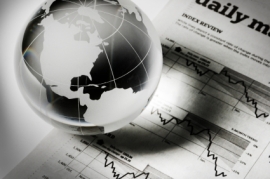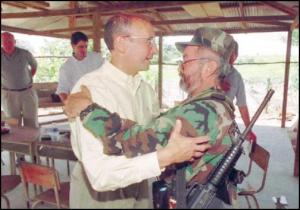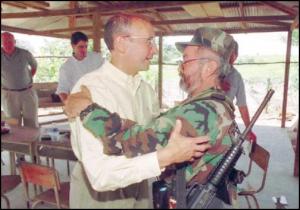Hijacking the Stock Market with High Frequency Trading
September 3, 2010
FT
At an industrial estate on the edge of Tseung Kwan O, a new town connected by road tunnel to Kowloon, work has started on a data centre where traders of stocks, futures, options and currencies will place their computers next to Hong Kong Exchanges’ own systems.
The idea is that by having their equipment only metres away from where the operator of the territory’s securities markets handles the trades, those for whom speed is everything can shave milliseconds off the time it takes for a transaction to be completed. It is a far cry from the days when shares were bought and sold by humans on a trading floor.
The concept – known as co-location – is growing fast. Last week, NYSE Euronext completed the move of trading in thousands of New York Stock Exchange-listed companies to a similar data centre in New Jersey. The Hong Kong facility is being built by the local exchange as one of its “strategic business initiatives”. The same is happening in India, where the National Stock Exchange has rented out racks of computer space for traders. In Australia, ASX plans a centre offering co-location by next August.
The speed with which exchanges are building such facilities is a sign of the global spread of a phenomenon gripping the markets: “high-frequency trading” (HFT). The phrase describes a style of electronic dealing that uses algorithms to dip automatically in and out of markets hundreds of times faster than the blink of a human eye.
The practice is controversial. In the US, HFT has chilling associations with the “flash crash” of May 6, when rapid, computer-driven orders were seen as a main culprit in sending the Dow Jones Industrial Average down by 1,000 points in 20 minutes – a fall unprecedented in its depth and speed.
Ted Kaufman, a US senator for Delaware, where many of America’s listed companies are incorporated, wrote to the Securities and Exchange Commission last month arguing that “excessive messaging traffic, the dissemination of proprietary market data catering to high-frequency traders, and order-routing inducements all may be combining in ways that cast doubts on the depth of liquidity, stability, transparency and fairness of our equity markets”.
Regulators such as the SEC are still puzzling over exactly what caused the flash crash. But what is clear is that it exposed fundamental flaws in the mechanics of today’s markets – and, some maintain, in the rules that govern them. High-frequency traders are by and large privately held, have no clients and trade using their own money. That has led, some believe, to a point where there has been a dangerous breakdown in investor trust in the way markets work.
Christian Thwaites, chief executive of Sentinel Investment Companies, a US asset manager, says: “The mystery and mystique of HFT, the lack of clarity and therefore opacity has meant that retail investors – who have obviously been terribly burned over the last few years – look at this and say: ‘this whole Wall Street thing is just rigged against me’.”
But like an invasive species in the natural world, HFT had grown rapidly before the wider public even noticed. Tabb Group, a consultancy, estimates that HFT now accounts for 56 per cent of all equity trades in the US and 38 per cent by value in Europe. Another sign that Asia is the latest growth spot came this week as traders and technology companies gathered for a Hong Kong conference billed as Asia’s first high-frequency trading event.
At the same time, changing regulations and increasing competition have created a complex matrix in the US of nine exchanges and dozens of other types of venue, including networks run by banks and brokers, and “dark pools” set up to handle large blocks of shares away from public markets. Exchanges now compete not only with each other for their order flow but also with bank and broker networks, including dark pools.
In Europe the same pattern has played out thanks to the Markets in Financial Instruments Directive, a European Commission regulation that broke the national monopolies of exchanges. Mifid allowed the emergence of rival platforms such as Chi-X Europe, fragmenting trading across many venues: the London Stock Exchange now accounts for only 55 per cent of trading in the stocks that comprise the FTSE 100 index.
Such fragmentation has been a driving force behind the growth of HFT, since it produces a variety of trading venues each with slightly different trading systems, speeds and fee schedules. This allows traders to exploit these differences by using computer algorithms to trade back and forth from one platform to another.
Concern is therefore growing that the markets may be morphing into little more than a playground for a specialised type of trading that has minimal economic benefit and contributes little if anything to capital formation – the traditional function of stock exchanges.
Established market users – such as the asset managers that take care of pension funds – say HFT, coupled with the fragmentation of trading across venues, makes it harder to rely on one of the most basic functions of the markets: orderly and fair price formation.
“Because of the predatory nature of some participants we have no incentive to post liquidity,” Kevin Cronin, head of equity trading at fund manager Invesco, told a hearing into the flash crash last month. “There are 40 places where stocks are transacted and none of us has clarity of supply and demand on most [equity] issues. These are fundamental issues as to what the value of a securities market is.”
One worry is the use in HFT of algorithms to direct trades automatically, often to several market centres at once. Not only do such algorithms generate huge volumes of trades, but they can – like any machinery – go wrong. The past six months have brought three cases where an algorithm has run amok – and those are only the ones that have been revealed publicly. The latest came last month when the Osaka Stock Exchange handed an “admonition” to Deutsche Bank for not having “a sufficient degree of control” over an algorithm trading Nikkei 225 index futures.
Mr Cronin is not alone in suspecting that certain kinds of algorithms are actually predatory. Analysts at Nanex, a Chicago market data company, say high-frequency traders may be using algorithms to send unusually heavy traffic to exchanges and other platforms in a deliberate attempt to slow down their data systems.
Knowing that a certain exchange’s system is about to run more slowly gives a trader an opportunity to set up a buy or sell order in advance. The process is called “quote stuffing” and is used in a strategy known as “latency arbitrage” – latency referring to the speed at which message traffic moves through a system.
In its analysis of the flash crash, Nanex managed to plot how the bursts of traffic looked visually on graphs. Many appeared as distinct geometric patterns, such as jagged shapes that Nanex dubbed “Bandsaw II”, and another pattern called the “Boston Zapper”. “There’s no economic justification for it,” says Eric Scott Hunsader, founder of Nanex. “If this is OK by everybody, the market is not going to function in a very short period of time.”
Some go further and suggest outright wrongdoing. “When orders get pinged out to multiple trading venues, there is at least circumstantial evidence that there’s quite widespread use of that information to front-run trades,” Jim McCaughan, chief executive of Principal Global Investors, a large US asset manager, told CNBC last month.
Yet for regulators it is hard to figure out who is behind any of the activity. That is because high-frequency traders can operate with minimal supervision. In Britain, for example, all it takes to set up a HFT operation is a company registration and the necessary technology.
Trading systems can be bought off the shelf from a number of specialist companies. Registration with the Financial Services Authority, the UK markets watchdog, is not needed under a long-standing exemption for people trading on their own account – as high-frequency traders do – unless they present themselves as marketmakers. Similarly, in the US some are registered as broker-dealers but many are not. “Some of the people who are doing the really big volumes are completely unregulated,” says one lawyer familiar with the business. “Now, they have become a potential systemic risk. That’s the issue.”
Many exchanges say they have controls in place that can detect unusual trading patterns before they cause trouble. Rolande Bellegarde, head of European execution at NYSE Euronext, says that a month ago the exchange disconnected the algorithm that a trader was using, after software detected that his dealings deviated significantly from the normal pattern the exchange had observed over time.
F or their part, the few HFT firms willing to show their face in public are at increasing pains to demonstrate that their business is beneficial to markets in providing liquidity and tighter bid-ask spreads.
Firms such as Getco, based in Chicago and formed by a pair of former pit traders, and peers in Europe including Optiver of the Netherlands, argue that high-frequency trading is a label used too loosely to describe almost any kind of rapid electronic trading, whether beneficial to markets or not. Getco and other US firms – excluding the banks and hedge funds that are equally big in HFT – recently formed an association to make their case more coherently.
Getco rejects allegations that high-frequency traders’ interests are at odds with those of ordinary investors. “While the story line may be a compelling narrative, there is no reliable evidence to suggest that this conflict exists. To the contrary, most retail brokers … intentionally route a majority of their customers’ marketable orders to firms that engage in high-frequency trading.”
Some studies back up their assertions. Woodbine Associates, a Connecticut consultancy, found in a study of US equity markets over 2008-09 that HFT had “improved execution quality”. Matt Samelson, a principal at the company, says that if there are any high-frequency traders “gaming the market”, then “we don’t think that constitutes the majority of HFT”.
But many asset managers remain unconvinced that the liquidity high-frequency traders provide is as valuable as they claim. For one thing, many exited the market during the flash crash. That has led to calls for regulators to impose as yet undefined obligations on marketmakers, including high-frequency traders. According to an online poll on FT Trading Room, a section of the Financial Times’ website focused on market structures, a clear majority (56 per cent) favours the move.
Asset managers worry that their interest in depth of liquidity and making long-term bets on company fundamentals is being crowded out by traders interested only in speed – cheered on by exchanges eager to offer incentives to attract such participants in order to stay ahead of rival platforms in the battle for liquidity. Exchanges have little incentive to discourage HFT since, aside from the fees it generates, they have found a new revenue stream in the rent they charge for rack space in data centres such as the ones emerging across Asia.
However, according to Mr McCaughan, investors are being put off by the volatility that phenomena such as HFT can cause. NYSE volumes were the lowest last week since 2006 – a fact that he attributes in part to a loss of trust in US equity market structures. “Our business is Main Street, not Wall Street,” he says, noting that Principal looks after “millions of people’s” pension schemes.
“We want to be able to look them in the eye and say the market is fair. And unfortunately, at the moment it’s quite difficult to do that.”
Copyright The Financial Times Limited 2010. You may share using our article tools. Please don’t cut articles from FT.com and redistribute by email or post to the web.






